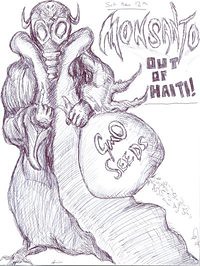| Back OpEd News | |||||||
|
Original Content at https://www.opednews.com/articles/Monsanto-seeds-in-Haiti-H-by-Chantal-Laurent-100605-837.html (Note: You can view every article as one long page if you sign up as an Advocate Member, or higher). |
|||||||
June 6, 2010
Monsanto seeds in Haiti: Haitian farmers' epic struggle for survival
By Chantal Laurent
Experts say that agrarian reform is what a newly revitalized Haiti needs. However, Monsanto's "gift" of "suicide/terminator seeds" to Haitian farmers is counter-productive and will not only contaminate the land, but will forever preclude farmers from growing organic food, making them dependent not only on Monsanto for more seeds, but on pesticides, fertilizers and growth other regulators.
::::::::
The following is a repost of Nadine Renazile's report from Seeds for Haiti on Facebook (posted today, 06.07.10 @ 4:00pm)This is the FACT SHEET Seeds for Haiti [that] will be distributing as part of our campaign to support Haiti's farmers in their epic fight against the Monsanto multinational corporation.
All thanks go to ANJI for her scrupulous research and reporting of facts.
- Monsanto is donating "$4 million worth of conventional hybrid corn and vegetable seeds to be made over the next 12 months"" Donations will include 60 tons of hybrid corn and vegetable seeds, a second shipment of 70 tons and possibly another 345 tons over the next 12 months.
- The hybrid seeds create the need for water and fungicides that cost more than locals can afford. The price of the seeds as well as shipping will also ultimately likely cost more than Haitian farmers can afford.
- According to the Monsanto blog, the seeds are treated with fungicides to prevent fungal diseases. The New Jersey government issued a cautionary statement on commonly used fungicides such as Thiram, which is used as a fungicide and seed disinfectant, and can have negative impacts when you breathe it in. According to the NJ Department of Health and Senior Services Hazardous Substance Fact Sheet, it can also cause skin allergies, rashes and breathing problems and "repeated exposure can affect the kidneys, liver and thyroid gland. High or repeated exposure may damage the nerves." The document also dubbed Thiram a mutagen and recommended wearing protective work clothing while exposed to Thiram and using local exhaust ventilation or respirators.
- Monsanto's May 20, 2010 blog post claims the seeds are hybrid and not GMO. The donation of the seeds have long-term consequences because they create a dependency on Monsanto seeds, which are expensive and corrosive to the land. They also said: "There are no contractual obligations between Haitian farmers and Monsanto since this is a donation. In fact, there are no business transactions at all between Monsanto and Haitian farmers in regards to these seeds. Monsanto is earning no revenue from this donation."
- Some seeds from Monsanto are described in the media as terminator seeds. According to the 2009 post on the Monsanto website, "Sterile seed technology is a type of Gene Use Restriction Technology (GURT) in which seed produced by a crop will not grow." The company says it sees positive and negative aspects of GURT but claims it "has never developed or commercialized a sterile seed product" If Monsanto should decide to move forward in the area of GURTs, we would do so in consultation with experts and stakeholders, including NGOs."
- The act of using these seeds contaminates the land and eliminates the ability of these Haitian farmers to grow and export organic agriculture in the near future. According to the California Organic Foods Act of 1979, foods described as organic or naturally grown must be produced: without the use of synthetically compounded fertilizers, pesticides or growth regulators. In the case of annual and two-year crops, no synthetically compounded fertilizers, pesticides or growth regulators may be applied to the area for 12 months before.
- The use of seeds also impacts the land in neighboring Dominican Republic.
- Monsanto has a history of making harmful chemicals. According to the Dow Chemical website, "Companies supplying Agent Orange to the government included The Dow Chemical Company, Monsanto Company, Hercules Inc., Diamond Shamrock Chemicals Company, Uniroyal Inc., Thompson Chemical and T-H Agriculture and Nutrition Company." While Dow says "scientific consensus is that when the collective human evidence is reviewed, it doesn't show that Agent Orange caused veteran's illnesses," the U.S. government thinks otherwise. On March 25, 2010, the U.S. Department of Veteran Affairs (VA) said this is a press release: "Well over 100,000 Veterans exposed to herbicides while serving in Vietnam and other areas will have an easier path to qualify for disability pay under a proposed regulation published by the VA that adds three new illnesses to the list of health problems found to be related to Agent Orange and other herbicide exposures." Based on data from an independent study by the Institute of Medicine, these three illnesses are: B cell leukemias, such as hairy cell leukemia; Parkinson's disease; and ischemic heart disease.
Authors Bio:
Chantal Laurent is a Haitian-American who blogs about Haiti, socio-economic, environmental and political issues at thehaitianblogger
